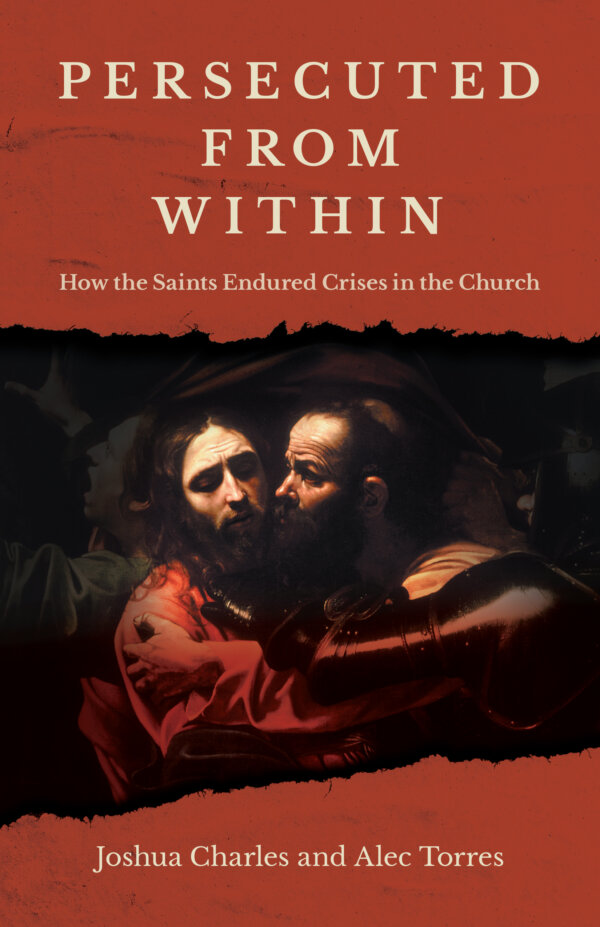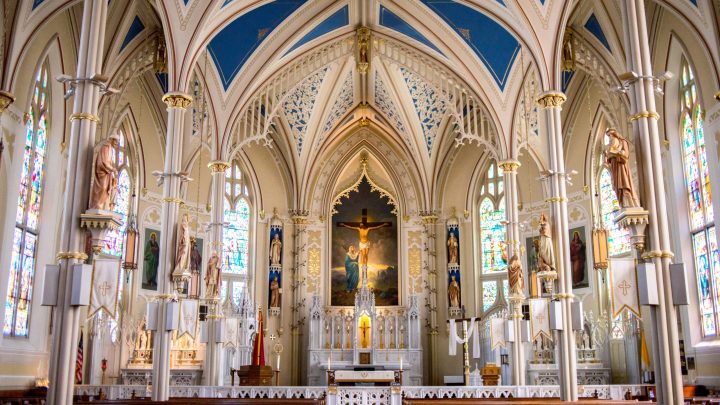
Here begins the first virtue in this series of Jesus’ Eucharistic Virtues: humility. It is appropriate to start with the virtue of humility, for the saints call it the foundation of the spiritual life. St. Peter Julian Eymard, “the Apostle of the Eucharist,” describes Jesus’ Eucharistic humility with these words:
Our Lord comes without pomp or majesty. On the altar, under the Eucharistic veils, He has the air of one who no longer has even a being. Is this sufficient abasement?
Thus to abase Himself, Our Lord employs all His power. By a prodigy He sustains these accidents. He overturns all the laws of nature in order to humble Himself. Who could envelop the sun with a cloud sufficiently dense to intercept its light and heat? That would be the greatest of miracles. But Our Lord did so in His Own Person. Under the Eucharistic Species, which in themselves are so insignificant, so ordinary. He, glorious and luminous, is hidden. He is God! O do not let us put Our Lord to shame, because He is so humiliated, so little!1
In the Eucharist, Jesus makes of humility His royal virtue; it becomes His royal mantle, as it were, the form of all His actions, the habitual exercise of His love, His perpetual sacrifice of praise to the heavenly Father. It veils His glory, His majesty, His power, His unceasing action in souls, and leaves in evidence only His poverty and weakness, His nothingness as a human creature, His love as our Savior. A eucharistic soul must reproduce in herself the humility of Jesus-Hostia, doing in reality and out of virtue what Jesus, glorious and triumphant, continues to do in His sacramental state.2
Our Lord must be honored and through the virtue which He manifests in the Blessed Sacrament. Now then, what virtue does He practice and teach there constantly and visibly, to all, even to the most ignorant? Humility: He is more humiliated there than in His birth, in His life, even His death. Here His annihilation veils and entombs everything, His divinity, His humanity, His words, and His actions. If then you want to honor Him, as is the essential duty of your vocation, honor Him in His condition of humility, imitate Him in what He is. He has descended lower than man, lower than a slave, lower than the least of animated beings, since He is a thing, an appearance of bread destined to be eaten and destroyed. Come down to His level.3
But there are two motives and two ways to practice humility: one comes from the realization of our sinfulness, and the other from our love of Jesus Christ humiliated. The first type is negativehumility; the second is positive. Both types are found in humility of the mind and in humility of the heart.4
How may we acquire this virtue? All we have to do is to enter into the mind of our Lord, to see and consult Him, to act under the influence of Jesus humbled out of love in His Sacrament and preferring this obscure state to all glory.5
Scripture paints a clear picture of Jesus’ virtues: loving, humble, meek, merciful, patient, and just. Yet, we can only truly see their full manifestation when we gaze upon the Holy Eucharist, especially concerning the virtue of humility. Many of us have been inspired by a saint or historical figure. Their lives challenge us to become more virtuous. Perhaps we even wish we could have met them and asked them to impart their wisdom to us. Unfortunately, this is not possible. However, with Jesus, it is possible.
In the Holy Eucharist, we don’t need to read about our Lord’s humility because He is present. Jesus’ past and future exist in the now. If we want to know who God is and seek to become like Him, then we ought to look no further than the Holy Eucharist. In the Holy Eucharist, Jesus teaches us what it is like to be humble. Every time we see Him in the Sacred Host, we ought to be convinced that He says to us: “Take my yoke upon you, and learn from me; for I am gentle and lowly in heart, and you will find rest for your souls. For my yoke is easy, and my burden is light” (Mt 11:29-30). Every time we are in Jesus’ Eucharistic presence, let us beseech Him to give us humble hearts. A humble person never boasts because he knows that everything is grace. And a humble soul is filled with awe and gratitude at God’s goodness even amid his struggles.
In our desire to be holy, we can easily become caught up in acquiring virtues that we lose sight of Who it is we are following. Our Eucharistic Lord is both the way to humility but also Humility itself. Our Lord wants us to be humble of mind and heart, but the surest means to acquiring humility is to study and spend time with our Eucharistic Lord. Have you ever noticed how spouses over time begin to look like each other and even share the same mannerisms? After all, Jesus declared that “the two shall become one” (Mk 10:8). When we are before the Eucharist, a similar phenomenon ought to happen to us, that is, we resemble Him. The more time we spend with our Eucharistic Lord, the more we are conformed to Him and, most of all, become like Him.
No one saint advanced in humility without the Holy Eucharist, for the Most Blessed Sacrament is the par excellence of humility. The Holy Eucharist is the mirror of humility. One look at Jesus alone can tell us whether we are like Him or not like Him. Spending five minutes before our Eucharistic Lord ought to humble us because before our very eyes is the God of the universe; Who is infinitely more brilliant than the greatest minds, infinitely more beautiful than the most beautiful human being, and infinitely more humble than the humblest person who ever lived.
Our Eucharistic Lord is veiled in humility to remind us that to become great in this life, we must become small. We must strive with all of our hearts to be like Him who willingly humbles Himself daily in the Holy Eucharist.
1St. Peter Julian Eymard. (1907). The Real Presence (New York: Fathers of the Blessed Sacrament, 1907), 144-145.
2St. Peter Julian Eymard, In the Light of the Monstrance, trans. Rev. Charles De Keyser (New York: The Sentinel Press, 1947), 75.
3St. Peter Julian Eymard, The Eucharistic and Christian Perfection (Part I), trans. by Amy Allen (New York, The Sentinel Press, 1948), 279.
4St. Peter Julian Eymard, In the Light of the Monstrance, trans. Rev. Charles De Keyser (New York: The Sentinel Press, 1947), 68.
5St. Peter Julian Eymard, In the Light of the Monstrance, trans. Rev. Charles De Keyser (New York: The Sentinel Press, 1947), 75.




